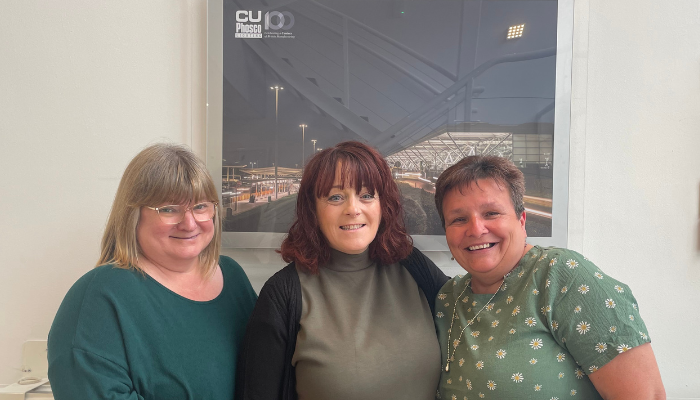At CU Phosco, we take the mental health of our employees very seriously. The effects of poor mental health are well documented, so as a business, we’ve taken steps to prevent this by setting up our Wellbeing Team in 2019.
Our Wellbeing Team consists of employees who have volunteered from different departments across all our facilities, providing regular campaigns to help promote positive mental health, as well as 9 qualified mental health first aiders on each site who support our colleagues when needed.
Ahead of the 2024 Mental Health Awareness week, we spoke to three members of the CU Phosco Wellbeing Team: Head of Marketing Clare Fuller (CF), Production Team Leader Shona Tranter (ST), and Credit Controller Lorraine Thompson (LT), who have a combined 59 years at CU Phosco.
Together we discussed how they all got involved with the Wellbeing Team, how they support colleagues, how colleagues support each other, and how we as a business make sure there’s #NoMindLeftBehind.
What made you want to be a part of the Wellbeing Team?
LT: I’m a people person, so for me I get a big kick out of being there for others, to help them through whatever difficulties they’re facing.
ST: In the near 24 years I’ve worked at CU Phosco, I’ve always been the person that other colleagues have confided in and come to for advice. I was never trained, it’s just the type of person I am, so when the opportunity came up for us to form a team and get some training, I jumped at the chance.
CF: I was asked to join the Wellbeing Team not long after starting at CU Phosco. I was really impressed in my interview by the options that the company has to support colleagues and when I was asked to join, I wanted to help and contribute to the CU Phosco community. The Wellbeing Team has a clear mission to support each other no matter what we are going through and that really resonated with me. Especially after the difficulties that the COVID years brought to light.
For those of us who aren't trained in helping with our colleagues' mental health, how can we assist?
CF: Know how to spot the signs. Then listen, don’t judge, offer support, and assist your colleagues to the right support if they need it. For some, just sitting and having a conversation with them can be enough, others may require professionals to assist. In the latter, we would offer professional support networks and contact details to explore. Sometimes people don’t know where to start, but just having a conversation, and someone to talk to, can be a huge help.
LT: I completely agree with what Clare said, but also, it can help to point your colleague towards your Wellbeing Team or whatever other businesses may have. A colleague may not know about the assistance that is on offer at work or may feel ashamed to approach. Having someone else bring them up or point them out can help put them at ease.
ST: Absolutely! It’s what we’re here for. You should never feel ashamed or embarrassed to come and speak to us about any issues you might be having. We’re here to listen and support at all times.
What is some best practice for us to keep out mental health in top form?
LT: A key thing for me is to take time out and do something you enjoy.
CF: Definitely. For everyone, it’s different. For me, it’s exercise. I go to the gym four times a week and do a variety of classes from boxing and Clubbercise, to yoga and weightlifting. I have made some amazing friends there, but they’ve also become a great support network and the laughter keeps me going!
ST: I think they’ve got all bases covered, but one thing I will add is that whenever any of the Wellbeing Team receive any new information on mental health, in any category, we ensure it is passed on to everyone. We are proactive with putting up posters on walls, updating our video display and publishing details on our internal staff Facebook page. We will make sure that all information is as clear and accessible to everyone across the business.
Finally, how do we as a business enure that there's #nomindleftbehind?
ST: By letting our colleagues know they’re never alone, the Wellbeing Team are always here to help.
LT: By being mindful of others’ feelings and needs and supporting wherever we can.
CF: By contributing as a business. We all deserve support, and everyone can contribute. Most people will experience an issue with their mental health at some point in their life, and most more than once. Therefore, we shouldn’t be restricted to talk about what we need and if we need support.
